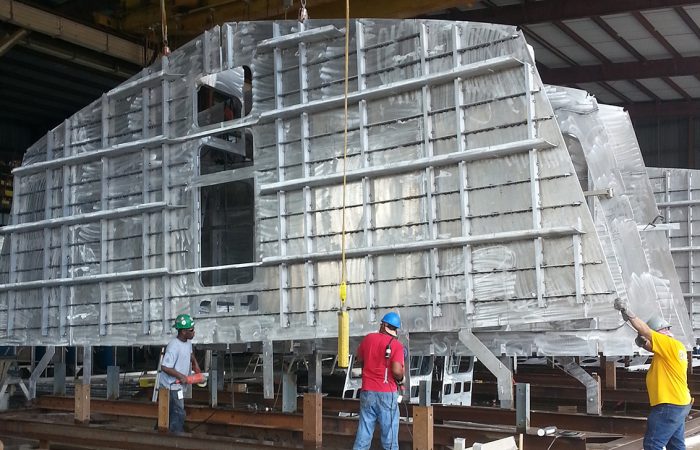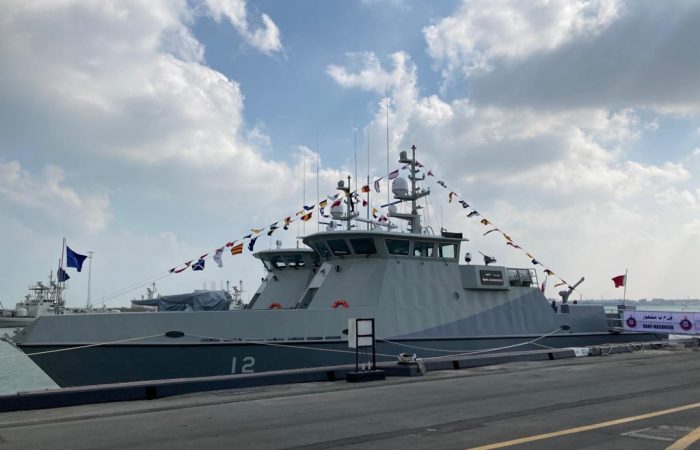shipbuilding
Proven Hulls and Advanced Technology
Shipbuilding has been our core business since our establishment in 1942. Since then, we have constructed over 1000 vessels for both military and commercial clients. We offer vessels of up to one hundred meters, crafted from aluminum, steel, or a combination of both.
Our approach to continuous development has always been to anticipate future trends and deliver innovations that reshape the shipbuilding industry. We have pioneered in many areas, from aluminum welding technology to noise reduction and even the conversion of commercial vessels into militarized unmanned platforms. We are determined to continue utilizing our experience and know-how to develop more efficient multi-mission vessels that are environmentally friendly, easy to maintain, and effectively support the missions and operational needs of modern naval and commercial fleets.
Shipbuilding
Swiftships provides end-to-end shipbuilding services, ranging from design and engineering to construction, testing, certification, and delivery of military and commercial vessels. Our experienced program managers support clients in all aspects, from requirements definition to vessel delivery. Additionally, our new vessel deliveries are complemented by hands-on training and warranty/technical support. Our services include:
- Ship Design and Engineering, including Pro-type Development
- Ship Fabrication, Hulls, Structures and Components
- System Integration
- Communication, Navigation and Sensors Integration
- Autonomous Systems Integration
- Weapon Systems and Armament
- Program Management
- Configuration Management
- Sea Trial/Testing

Support Services

With the intent to help our clients successfully employ newly acquired ships into their fleet and operations, Swiftships offers professional services for vessel delivery, commissioning, and operator/crew training. We also provide cost-effective and timely warranty support, technical assistance, and spare parts provision. Many of our clients choose Swiftships’ services for continuous maintenance.
- Integrated Logistics Support (ILS)
- Commissioning
- Crew/Operator Training
- Specialized Training
- Warranty/Technical Assistance
- Spare Parts
- Vessel's Life Cycle Services
Kits Fabrication
Swiftships’ flexibility in developing programs that meet customers’ requirements is exemplified in our hybrid solutions for manufacturing ships. In this scenario, kits are produced in one of our facilities, and shipped to the client’s location for assembly. This option gives several advantages to our clients:
- Access and use of proven existing and certified technical designs
- Production of vessels with the same processes we use for in-house construction
- Leverage our supply chain for reduced material cost
- Reduction of labor costs
- Saving the client non-recurring costs for acquiring production tools
- Saving the client recurring operational costs for larger than needed production facilities
- Local capability to manufacture the same standard/quality ships as in Swiftships' USA facilities

Ship Testing, Certification and Delivery

All our boats are designed to meet ABS (or equivalent) certification and US Coast Guard regulatory requirements and undergo rigorous harbor and sea acceptance trials to prove the same.
Delivering ships from our production yards to the customer can be accomplished mainly in two ways: the ship sails on its own power to the destination, or the ship is loaded on a larger ship as cargo and delivered to a destination port.
Either way Swiftships provides assistance to its clients with international logistics requirements, including export licenses as required by the U.S. Department of Defense (DoD) and transportation.
How Can We Work Together?
Of course, we can build your vessels in our location! But if for some economic or strategic reasons, you choose vessels’ construction at your location – Swiftships can provide you with full support. We have extensive experience working with international clients on co-production programs, and we offer customized solutions to meet your needs. Learn more…
Contract Methods
Swiftships has equal experience working both sales methods: Direct Commercial Sales (DCS) and Foreign Military Sales (FMS). Each has its own advantages; we invite you to contact us to discuss which method best suits your case.
Direct Commercial Sales
Swiftships has comprehensive experience with military clients using Direct Commercial Sales (DCS) while adhering to the U.S. State Department (DOS) program requirements. We establish those contracts by working directly with the end clients to set their requirements and submit final documents to DOS for the required licenses.
Foreign Military Sales
Foreign Military Sales (FMS) is growing and has become a popular method for selling defense systems abroad. We have sold over 300 vessels through FMS as we offer numerous benefits to our clients, including the ability to reach a broader base of local shipyards, reduce the risk inherent in international sales, such as facilitation and planning.
Our Support in DCS
We obtain industry allowance for weapons’ sales and other defense articles, defense services and military training to foreign clients from the Bureau of Political Military Affairs’ Directorate of Defense Trade Controls (DDTC). Swiftship fulfills the rules and regulations of:
- The Arms Control Export Act
- International Traffic in Arms Regulations (ITAR)
- Military Critical Technologies List
We are expert in dealing with complex processes and changes:
- Every year Congress requires the U.S. State Department to prepare “Section 655” report on military assistance, exports, and imports under the Foreign Assistance Act. Swiftships contributes by providing its own reports, detailing the end-use of the controlled U.S. weapons systems it has sold and exported.
- Our relationship with foreign trade partners, such as MBDA, OTO Melara, and DRS Technology, allows us to be a leader in Arms and Integration under Direct Commercial Sales (DCS).
FMS Benefits
Broad Market Access
The FMS system makes every allied nation a potential customer, by including the U.S. companies’ products in the standardized catalog for international sale.
Risk Reduction
FMS reduces the risk involved in working with foreign customers since an FMS is effectively a sale to the USG, not to the end-user.
Facilities’ Planning
FMS orders have generous lead times from concept to delivery, allowing plenty of time for planning and production.
Reduced Administrative Burden
All international logistics requirements, including export licenses and transportation, are managed by the U.S. Department of Defense (DoD).
Frequently Asked Questions?
Is FMS more expensive than DCS?
Yes. In most cases, it is not possible to compare FMS and DCS costs directly. Under the FMS program, the U.S. Government charges an administrative fee, whereas in DCS there is no associated fee.
Is DCS delivery guaranteed?
Yes, as the client can obligate the builder to provide a performance bond.
Did You Know?
Who can participate in the FMS program?
The US Government designates countries and international organizations eligible to participate in the FMS program. The Department of State makes recommendations and approves individual programs on a case-by-case basis. Currently, around 160 countries are eligible to participate in FMS.
What Are Some Other Differences Between FMS and DCS?
Under FMS, the Department of Defense (DoD) procures defense articles and services for the foreign customer using the same acquisition process used to procure its own military needs. Recent policy changes in the U.S. Government’s Federal Acquisition. Regulations have opened the door, allowing foreign governments to participate in FMS procurement negotiations.
In general, the government-to-government purchase agreements tend to ensure standardization with U.S. forces, provide contract administrative services that may not be available through the private sector, and help lower unit costs by consolidating purchases for FMS customers with those of DoD. DCS allows the foreign customer more direct involvement during the contract negotiation phase and may allow firm-fixed pricing.

